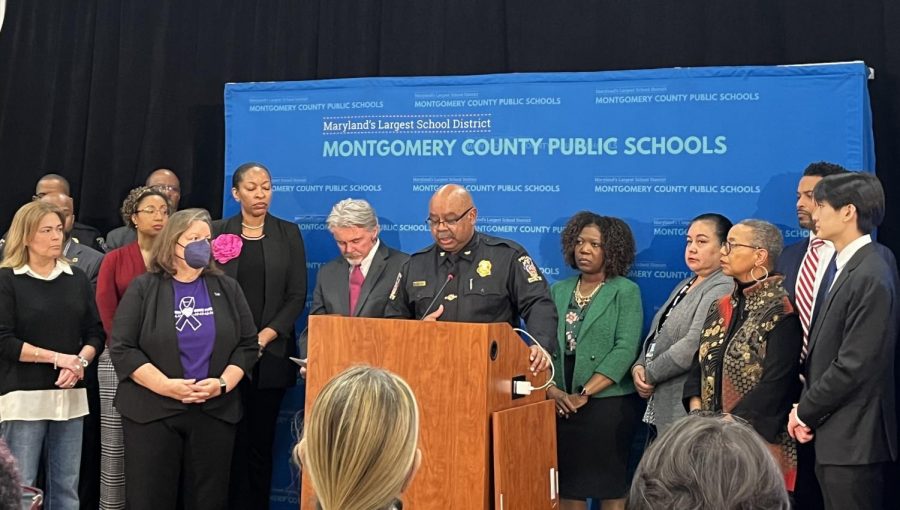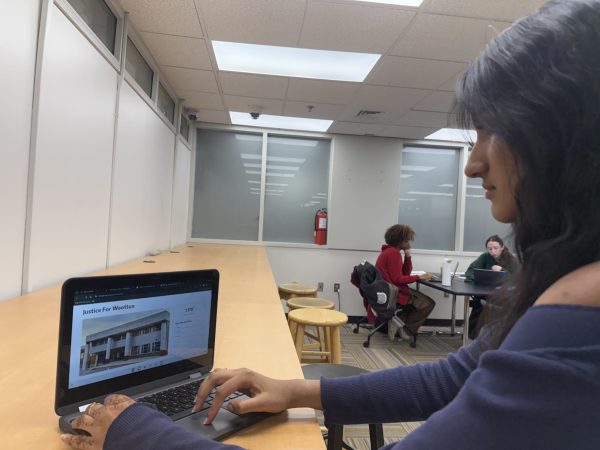Fentanyl puts MCPS youth at risk
Chief of Montgomery County Police Department Marcus Jones addressed growing concern for fentanyl related deaths among MCPS youth in a media briefing on Jan. 9.
On Jan. 19, a media conference was held at the Carver Educational Center, addressing recent youth opioid overdoses occurring in the MCPS community.
The briefing was held in response to the recent death of 16-year-old Whitman student Landen Hausman, who had an accidental fentanyl overdose on Jan. 17 after taking what he believed to be a percocet pill. The individual responsible for distributing the pill that killed Hausman, Mikiyas Kefyalew, was arrested and charged with distributing the drug.
“We’ve experienced some troubling incidents involving Montgomery County youth,” Chief of Police Marcus Jones said. “Today it’s my hope that we can provide information and resources to parents and families that might help save lives.”
This event brought attention to a growing issue within MCPS: a rise in non-fatal and fatal overdoses among MCPS youth. Data provided during the briefing compared the number of overdoses that occurred in 2021 and 2022, with there being a 120% increase in fatal overdoses in the past year. “This is an alarming trend of illegal opioids harming our community,” Superintendent Dr. Monifa McKnight said.
In a call to action, MCPS is partnering with the Montgomery County Police Foundation in order to start an education campaign, called Community Opioid Prevention Education (COPE), regarding the threat fentanyl poses to youth in MCPS. “The COPE trailer is designed to go to public events, so the community can go inside and see the warning signs of drug abuse,” Jones said.
MCPS hopes that by educating parents and students, there will be awareness of the danger surrounding taking drugs that could be laced. The education campaign also has the goal of creating more spaces in which conversations regarding drug usage can be discussed, and students who may be struggling can receive help.
“Education can save lives,” Maryland State Attorney John McCarthy said. “We want to work to educate our parents within the community, as well as our children, who are truly at risk.”
Elena Suarez, who is involved with MCPS organization Surviving Our Ultimate Loss (SOUL), spoke about her personal experience of losing a child to a fentanyl overdose. Suarez’s daughter, Collette Russ, passed away on Aug. 26, 2020, after accidentally overdosing on fentanyl. Russ, a Churchill graduate, struggled with mental health, and became addicted to crack cocaine.
“Behind every addict, there is a personal story,” Suarez said. “There is a horrible stigma attached to addiction and substance users. What we need is more compassion.”
Situations involving fentanyl overdoses often stem from students using counterfeit drugs, who are often not aware that they are laced with fentanyl, which is 50 times more dangerous than heroin. Fentanyl can kill in small doses, with one in four opioid pills containing enough to overdose. “In Maryland, in about 90% of the opiate related deaths, fentanyl is the root cause of death,” Maryland State Attorney John McCarthy said.
Fentanyl related overdoses has been an increasing national issue, with over 100,000 people dying due to opiates last year (a 28% increase from the year before). Maryland ranks third in the country for most deaths related to fentanyl. “We can dramatically impact the opioid crisis through education and prevention, and access to better alternative treatments,” Suarez said.
One of the speakers, MCPS School System Medical Officer Dr. Patricia Kapunan, shared what students can do to help prevent more fentanyl overdoses from occurring. Students are encouraged to speak up if they notice something is wrong, as well as call 911 if a peer is actively overdosing. Under Good Samaritan laws, individuals who assist during an overdose will not be prosecuted for calling 911, even if there is drug paraphernalia present. “Being vigilant is the first step,” Kapunan said.
Students can also help prevent overdose by learning about opioids like fentanyl, and its reversal agent, Naloxone (Narcan). MCPS medical staff are trained in administering narcan when needed, and all MCPS schools have Narcan on site.
There are also numerous resources provided by MCPS that help students and families seek help for substance use and recovery, such as Montgomery Goes Purple, and Child and Adolescent Assessment Services. If you are experiencing problems with mental health, you can call 988, text or chat in order to reach mental health services. “Anyone having any mental health emergency, can get help by contacting 988,” Kapunan said. “We also have the Montgomery Crisis center, which is open 24/7.”
Your donation will support the student journalists of Thomas S. Wootton High School. Your contribution will allow us to purchase equipment and cover our annual website hosting costs.
Sarah is a 2023 graduate.







